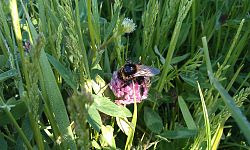

A ban on bee-killing pesticides has been postponed, as Member State experts failed to agree on a binding decision to end their use.
In January, the European Commission proposed to ban three neonicotinoids found to affect the health of Europe's dwindling bee population. This followed a report by the EU's food watchdog - the European Food Safety Authority (EFSA) - which identified a number of risks posed to bees by the insecticides.
Most Member States voted in favour of the ban, but the qualified majority threshold needed to make it binding was not met. Five Member States abstained, including the UK, Germany and Bulgaria, while nine countries, including Romania, Hungary and Finland, voted against the ban. The Brussels executive can now either refer a revised proposal back to a formal committee for review or send the original text to an appeals committee within two months.
If there is no qualified majority in the appeals committee, the Commission can itself adopt a regulation. The appeal vote would still need a qualified majority but this time against the proposal. If it fails to reach that, the proposal will be implemented and Member States cannot challenge it.
However, pro-environment advocates say big industry will attempt to water down the proposal. "The scientific evidence is clear, but pesticides companies like Syngenta and Bayer will continue to lobby to delay a ban as much as possible," said Greenpeace EU agriculture policy director Marco Contiero. Meanwhile, a number of Member States, including Germany, say they favour the ban but with conditions. This could include exemptions on the basis that the neonicotinoids kill the bees only when mixed with airborne particles of dust.